Select Works of Aristotle (40 vols.)
Digital Logos Edition
Overview
Though primarily known as a philosopher, Aristotle made substantial contributions to nearly every academic subject existing in his time. Over 2,400 years after his death, many of his teachings still lay the foundation for modern schools of thought. His zoological notes and observations were so far ahead of their time that some of them were not confirmed until the nineteenth century. An exceptional student of Plato, Aristotle was trained by the best educator the world had to offer; his own insights pushed away from Plato’s archetypes towards an experiential understanding of the world around him, giving birth to Aristotelian logic. This understanding led to some of history’s most profound observations of the way the world works. Aristotle achieved a deeper understanding of reality than countless philosophers before and after his time.
Included in the Select Works of Aristotle (40 vols.) are many of his surviving texts covering a wide range of subjects. Most of the works Aristotle prepared for publication no longer exist, but the remains have become almost essential to Western thought. The texts contained in this collection are likely his notes from lectures, with a few more polished works. Some of these texts are also believed to have been written by other scholars at the school where Aristotle taught. Together, these texts offer valuable insight from one of the greatest minds to ever live. Students of philosophy, Greek, anthropology, politics, the Greco-Roman world, and the sciences will enjoy these fascinating works.
This collection contains the complete texts in their Loeb Classical Library editions. Each volume is included in its original Greek with an English translation for easy side-by-side comparison. Logos’ language tools help you to go deeper into the Greek texts and explore Aristotle’s fascinating language. Use the dictionary lookup tool to examine difficult Greek words and find every occurrence in your library. There’s never been a better way for students of history, medicine, culture, and Greek and Latin literature to absorb these intriguing works.
This title is included in the following collections
You can save when you purchase this product as part of a collection.
Classic Catholic Scholarship C...
$3,413.99$3,413.99Classic Scholarship Collection...
$12,102.39$7,299.99

Key Features
- 40 volumes of Aristotle’s insightful observations about the world
- Some of the most important philosophy of all time
- Loeb Classical Library editions
Product Details
- Title: Select Works of Aristotle
- Author: Aristotle, Pseudo-Longinus, Demetrius of Phalerum
- Editors: T. E. Page, E. Capps, W. H. D. Rouse, L. A. Post, E. H. Warmington
- Series: Loeb Classical Library
- Publishers: G. P. Putnam’s Sons and Harvard University Press
- Volumes: 40
- Pages: 10,846
Individual Titles
- The “Art” of Rhetoric
- The “Art” of Rhetoric: Greek Text
- Nicomachean Ethics
- Nicomachean Ethics: Greek Text
- Politics
- Politics: Greek Text
- Aristotle: The Poetics; “Longinus”: On the Sublime. Demetrius: On Style
- Aristotle: The Poetics; “Longinus”: On the Sublime. Demetrius: On Style: Greek Text
- Metaphysics, vol. 1: Books 1–9
- Metaphysics, vol. 1: Books 1–9: Greek Text
- Metaphysics, vol. 2: Books 10–14. Oeconomica. Magna Moralia
- Metaphysics, vol. 2: Books 10–14. Oeconomica. Magna Moralia: Greek Text
- The Athenian Constitution. The Eudemian Ethics. On Virtues and Vices
- The Athenian Constitution. The Eudemian Ethics. On Virtues and Vices: Greek Text
- Physics, vol. 1: Books 1–4
- Physics, vol. 1: Books 1–4: Greek Text
- Physics, vol. 2: Books 5–8
- Physics, vol. 2: Books 5–8: Greek Text
- Minor Works
- Minor Works: Greek Text
- Problems: Books 1–21
- Problems: Books 1–21: Greek Text
- Problems: Books 22–38
- Problems: Books 22–38: Greek Text
- Parts of Animals. Movement of Animals. Progression of Animals.
- Parts of Animals. Movement of Animals. Progression of Animals.: Greek Text
- Categories. On Interpretation. Prior Analytics
- Categories. On Interpretation. Prior Analytics: Greek Text
- On the Heavens
- On the Heavens: Greek Text
- Generation of Animals
- Generation of Animals: Greek Text
- Meteorologica
- Meteorologica: Greek Text
- On Sophistical Refutations. On Coming-To-Be and Passing-Away. On the Cosmos
- On Sophistical Refutations. On Coming-To-Be and Passing-Away. On the Cosmos: Greek Text
- On the Soul. Parva Naturalia. On Breath
- On the Soul. Parva Naturalia. On Breath: Greek Text
- Posterior Analytics. Topica
- Posterior Analytics. Topica: Greek Texts
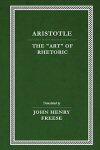
This volume contains John Henry Freese’s translation of all three books of The “Art” of Rhetoric.
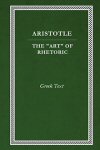
This volume contains the Greek text of all three books of The “Art” of Rhetoric.
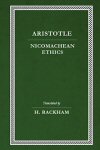
Nicomachean Ethics
- Author: Aristotle
- Translator: H. Rackham
- Series: Loeb Classical Library
- Publisher: Harvard University Press
- Publication Date: 1926
- Pages: 344
This volume contains H. Rackham’s translation of Nicomachean Ethics.
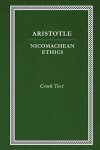
Nicomachean Ethics: Greek Text
- Author: Aristotle
- Translator: H. Rackham
- Series: Loeb Classical Library
- Publisher: Harvard University Press
- Publication Date: 1926
- Pages: 344
This volume contains the Greek text of Nicomachean Ethics.
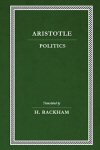
Politics
- Author: Aristotle
- Translator: H. Rackham
- Series: Loeb Classical Library
- Publisher: Harvard University Press
- Publication Date: 1932
- Pages: 342
This volume contains H. Rackham’s translation of all eight books of Politics.
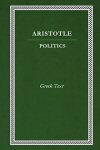
Politics: Greek Text
- Author: Aristotle
- Translator: H. Rackham
- Series: Loeb Classical Library
- Publisher: Harvard University Press
- Publication Date: 1932
- Pages: 342
This volume contains the Greek text of all eight books of Politics.
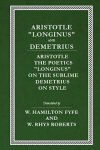
Aristotle: The Poetics. “Longinus”: On the Sublime. Demetrius: On Style
- Authors: Aristotle, Pseudo-Longinus, and Demetrius of Phalerum
- Translators: W. Hamilton Fyfe and W. Rhys Roberts
- Series: Loeb Classical Library
- Publisher: Harvard University Press
- Publication Date: 1932
- Pages: 251
This volume contains The Poetics and On the Sublime, translated by W. Hamilton Fyfe, and On Style translated by W. Rhys Roberts.
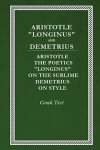
Aristotle: The Poetics. “Longinus”: On the Sublime. Demetrius: On Style: Greek Text
- Authors: Aristotle, Pseudo-Longinus, and Demetrius of Phalerum
- Translators: W. Hamilton Fyfe and W. Rhys Roberts
- Series: Loeb Classical Library
- Publisher: Harvard University Press
- Publication Date: 1932
- Pages: 250
This volume contains The Poetics by Aristotle, On the Sublime, which is often attributed to Dionysius of Halicarnassus or Longinus, and On Style, which is attributed to Demetrius of Phalerum.
Pseudo-Longinus is the name contemporary scholarship gives to the author of On the Sublime. While early manuscripts list Longinus as the author, scholars find the work contradictory to Longinus’ known works and believe the attribution was a mistake. It has also been argued that the author was Dionysius of Halicarnassus, though the date of publication discredits that possibility as well.
Demetrius of Phalerum (c. 350–280 BC) was an Athenian orator and student of Theophrastus’. History credits him as the writer of On Style, though scholarship suggests he was likely not the author.
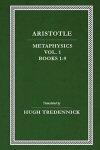
Metaphysics, vol. 1: Books 1–9
- Author: Aristotle
- Translator: Hugh Tredennick
- Series: Loeb Classical Library
- Publisher: Harvard University Press
- Publication Date: 1933
- Pages: 260
This volume contains Hugh Tredennick’s translation of the first nine books of Metaphysics.
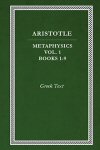
Metaphysics, vol. 1: Books 1–9: Greek Text
- Author: Aristotle
- Translator: Hugh Tredennick
- Series: Loeb Classical Library
- Publisher: Harvard University Press
- Publication Date: 1933
- Pages: 260
This volume contains the Greek text of the first nine books of Metaphysics.
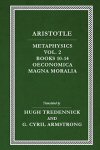
Metaphysics, vol. 2: Books 10–14. Oeconomica. Magna Moralia
- Author: Aristotle
- Translators: Hugh Tredennick and G. Cyril Armstrong
- Series: Loeb Classical Library
- Publisher: Harvard University Press
- Publication Date: 1935
- Pages: 354
This volume contains Hugh Tredennick and G. Cyril Armstrong’s translations of the last five books of Metaphysics.
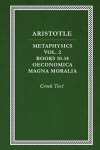
Metaphysics, vol. 2: Books 10–14. Oeconomica. Magna Moralia: Greek Text
- Author: Aristotle
- Translators: Hugh Tredennick and G. Cyril Armstrong
- Series: Loeb Classical Library
- Publisher: Harvard University Press
- Publication Date: 1935
- Pages: 350
This volume contains the Greek text of the last five books of Metaphysics.
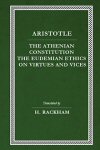
The Athenian Constitution. The Eudemian Ethics. On Virtues and Vices
- Author: Aristotle
- Translator: H. Rackham
- Series: Loeb Classical Library
- Publisher: Harvard University Press
- Publication Date: 1935
- Pages: 255
This volume contains H. Rackham’s translation of The Athenian Constitution, The Eudemian Ethics, and On Virtues and Vices.
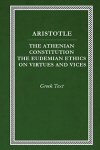
The Athenian Constitution. The Eudemian Ethics. On Virtues and Vices: Greek Text
- Author: Aristotle
- Translator: H. Rackham
- Series: Loeb Classical Library
- Publisher: Harvard University Press
- Publication Date: 1935
- Pages: 250
This volume contains the Greek text of The Athenian Constitution, The Eudemian Ethics, and On Virtues and Vices.

Physics, vol. 1: Books 1–4
- Author: Aristotle
- Translators: P. H. Wicksteed and F. M. Cornford
- Series: Loeb Classical Library
- Publisher: Harvard University Press
- Publication Date: 1957
- Pages: 264
This volume contains P. H. Wicksteed and F. M. Cornford’s translations of the first four books of Physics.
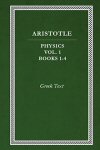
Physics, vol. 1: Books 1–4: Greek Text
- Author: Aristotle
- Translators: P. H. Wicksteed and F. M. Cornford
- Series: Loeb Classical Library
- Publisher: Harvard University Press
- Publication Date: 1957
- Pages: 264
This volume contains the Greek text of the first four books of Physics.
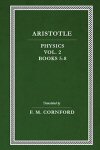
Physics, vol. 2: Books 5–8
- Author: Aristotle
- Translator: F. M. Cornford
- Series: Loeb Classical Library
- Publisher: Harvard University Press
- Publication Date: 1934
- Pages: 232
This volume contains F. M. Cornford’s translation of the last four books of Physics.
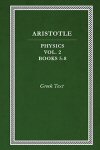
Physics, vol. 2: Books 5–8: Greek Text
- Author: Aristotle
- Translator: F. M. Cornford
- Series: Loeb Classical Library
- Publisher: Harvard University Press
- Publication Date: 1934
- Pages: 232
This volume contains the Greek text of the last four books of Physics.
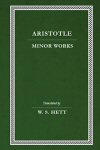
Minor Works
- Author: Aristotle
- Translator: W. S. Hett
- Series: Loeb Classical Library
- Publisher: Harvard University Press
- Publication Date: 1936
- Pages: 258
This volume contains W. S. Hett’s translation of an assortment of Aristotle’s works, including On Colours, On Things Heard, Physiognomics, On Plants, On Marvellous Things Heard, Mechanical Problems, On Indivisible Lines, Situations and Names of Winds, and On Melissus, Xenophanes, and Gorgias, with an introduction to each text.
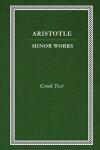
Minor Works: Greek Text
- Author: Aristotle
- Translator: W. S. Hett
- Series: Loeb Classical Library
- Publisher: Harvard University Press
- Publication Date: 1936
- Pages: 258
This volume contains the Greek text of an assortment of Aristotle’s works, including On Colours, On Things Heard, Physiognomics, On Plants, On Marvellous Things Heard, Mechanical Problems, On Indivisible Lines, Situations and Names of Winds, and On Melissus, Xenophanes, and Gorgias.
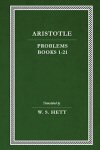
Problems: Books 1–21
- Author: Aristotle
- Translator: W. S. Hett
- Series: Loeb Classical Library
- Publisher: Harvard University Press
- Publication Date: 1936
- Pages: 240
This volume contains W. S. Hett’s translation of the first 21 books of Problems.
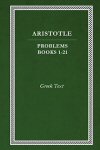
Problems: Books 1–21: Greek Text
- Author: Aristotle
- Translator: W. S. Hett
- Series: Loeb Classical Library
- Publisher: Harvard University Press
- Publication Date: 1936
- Pages: 240
This volume contains the Greek text of the first 21 books of Problems.
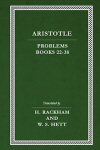
Problems: Books 22–38
- Author: Aristotle
- Translator: W. S. Hett and H. Rackham
- Series: Loeb Classical Library
- Publisher: Harvard University Press
- Publication Date: 1937
- Pages: 228
This volume contains W. S. Hett’s translation of the remainder of Problems, as well as H. Rackham’s translation of Rhetorica and Alexandrum.
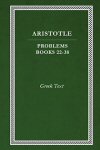
Problems: Books 22–38: Greek Text
- Author: Aristotle
- Translator: H. Rackham
- Series: Loeb Classical Library
- Publisher: Harvard University Press
- Publication Date: 1937
- Pages: 228
This volume contains the Greek text of the remainder of Problems and Rhetorica and Alexandrum.
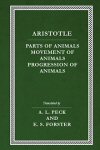
Parts of Animals. Movement of Animals. Progression of Animals
- Author: Aristotle
- Translators: A. L. Peck and E. S. Forster
- Series: Loeb Classical Library
- Publisher: Harvard University Press
- Publication Date: 1937
- Pages: 280
This volume contains A. L. Peck and E. S. Forster’s translations of some of Aristotle’s zoological works, including Parts of Animals, Movement of Animals, and Progression of Animals.
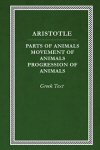
Parts of Animals. Movement of Animals. Progression of Animals: Greek Text
- Author: Aristotle
- Translators: A. L. Peck and E. S. Forster
- Series: Loeb Classical Library
- Publisher: Harvard University Press
- Publication Date: 1937
- Pages: 280
This volume contains the Greek text of some of Aristotle’s zoological works, including Parts of Animals, Movement of Animals, and Progression of Animals.
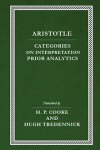
Categories. On Interpretation. Prior Analytics
- Author: Aristotle
- Translator: H. P. Cooke and Hugh Tredennick
- Series: Loeb Classical Library
- Publisher: Harvard University Press
- Publication Date: 1938
- Pages: 280
This volume contains H. P. Cooke and Hugh Tredennick’s translations of Categories, On Interpretation, and Prior Analytics.
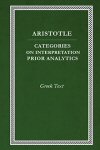
Categories. On Interpretation. Prior Analytics: Greek Text
- Author: Aristotle
- Translator: H. P. Cooke and Hugh Tredennick
- Series: Loeb Classical Library
- Publisher: Harvard University Press
- Publication Date: 1938
- Pages: 280
This volume contains the Greek text of Categories, On Interpretation, and Prior Analytics.
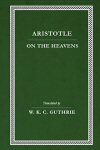
On the Heavens
- Author: Aristotle
- Translator: W. K. C. Guthrie
- Series: Loeb Classical Library
- Publisher: Harvard University Press
- Publication Date: 1939
- Pages: 187
This volume contains W. K. C. Guthrie’s translation of On the Heavens.
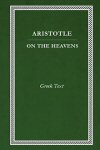
On the Heavens: Greek Text
- Author: Aristotle
- Translator: W. K. C. Guthrie
- Series: Loeb Classical Library
- Publisher: Harvard University Press
- Publication Date: 1939
- Pages: 187
This volume contains the Greek text of On the Heavens.
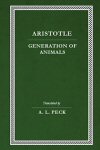
Generation of Animals
- Author: Aristotle
- Translator: A. L. Peck
- Series: Loeb Classical Library
- Publisher: Harvard University Press
- Publication Date: 1942
- Pages: 304
This volume contains A. L. Peck’s translation of Generation of Animals.
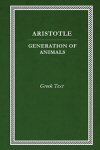
Generation of Animals
- Author: Aristotle
- Translator: A. L. Peck
- Series: Loeb Classical Library
- Publisher: Harvard University Press
- Publication Date: 1942
- Pages: 304
This volume contains the Greek text of Generation of Animals.
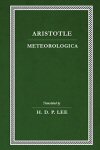
Meteorologica
- Author: Aristotle
- Translator: H. D. P. Lee
- Series: Loeb Classical Library
- Publisher: Harvard University Press
- Publication Date: 1952
- Pages: 238
This volume contains H. D. P. Lee’s translation of Meteorologica.
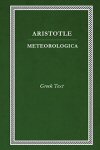
Meteorologica: Greek Text
- Author: Aristotle
- Translator: H. D. P. Lee
- Series: Loeb Classical Library
- Publisher: Harvard University Press
- Publication Date: 1952
- Pages: 238
This volume contains the Greek text of Meteorologica.
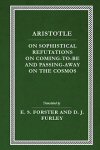
On Sophistical Refutations. On Coming-To-Be and Passing-Away. On the Cosmos
- Author: Aristotle
- Translators: E. S. Forster and D. J. Furley
- Series: Loeb Classical Library
- Publisher: Harvard University Press
- Publication Date: 1955
- Pages: 215
The volume contains E. S. Forster’s translations of On Sophistical Refutations and On Coming-To-Be and Passing-Away, as well as D. J. Furley’s translation of On the Cosmos.
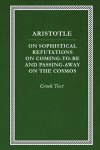
On Sophistical Refutations. On Coming-To-Be and Passing-Away. On the Cosmos: Greek Text
- Author: Aristotle
- Translators: E. S. Forster and D. J. Furley
- Series: Loeb Classical Library
- Publisher: Harvard University Press
- Publication Date: 1955
- Pages: 215
The volume contains the Greek text of On Sophistical Refutations, On Coming-To-Be and Passing-Away, and On the Cosmos.
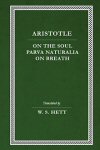
On the Soul. Parva Naturalia. On Breath
- Author: Aristotle
- Translator: W. S. Hett
- Series: Loeb Classical Library
- Publisher: Harvard University Press
- Publication Date: 1957
- Pages: 273
This volume contains W. S. Hett’s translations of On the Soul, Parva Naturalia, and On Breath.
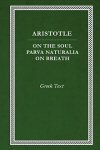
On the Soul. Parva Naturalia. On Breath: Greek Text
- Author: Aristotle
- Translator: W. S. Hett
- Series: Loeb Classical Library
- Publisher: Harvard University Press
- Publication Date: 1957
- Pages: 273
This volume contains the Greek text of On the Soul, Parva Naturalia, and On Breath.
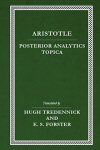
Posterior Analytics. Topica
- Author: Aristotle
- Translators: Hugh Tredennick and E. S. Forster
- Series: Loeb Classical Library
- Publisher: Harvard University Press
- Publication Date: 1960
- Pages: 380
This volume contains Hugh Tredennick’s translation of Posterior Analytics and E. S. Foster’s translation of Topica.
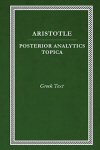
Posterior Analytics. Topica: Greek Text
- Author: Aristotle
- Translators: Hugh Tredennick and E. S. Forster
- Series: Loeb Classical Library
- Publisher: Harvard University Press
- Publication Date: 1960
- Pages: 375
This volume contains the Greek text of Posterior Analytics and Topica.
About Aristotle
Aristotle (384–322 BC) was a Greek philosopher who studied a broad range of subjects, including physics, metaphysics, poetry, theater, music, logic, rhetoric, linguistics, politics, government, ethics, biology, and zoology. He was a student of Plato’s and a teacher of Alexander the Great. His works provided the first formal study of logic, and his philosophy is still widely studied today. Nearly all of the works he prepared for publication were lost, but substantial notes and fragments have survived for over 2,000 years.
Reviews
4 ratings

SEONGJAE YEO
10/5/2019
Dr. Gordon Arthur
1/9/2019
Joe Plaso
9/22/2018
Initially, a large portion of the Greek texts in these volumes were not morphologically tagged. Since then, MOST issues appear to have been fixed. The only exception I see is The Athenian Constitution. When this last resource is properly tagged, I will happily upgrade my rating to 5 stars - thank you. Otherwise, this is a valuable set of volumes from the Greek classics.

Rev. Dr. George J. Gatgounis, Esq.
11/5/2016
As a full-blooded Greek, I can not thank Logos enough for making this magnum opus available in both English and Greek ... incidentally, this author believed that those who did not speak Greek were "barbarians" lol! Cf. Luke 16.8b ...James H. Drennan
4/30/2016
I am very interested in obtaining this collection of Aristotle's works. I instruct home schooled high school students in Apologetics. The Apologetics course contains sessions about matter, form, and essential causes as well as basic philosophical logic. This reference set would be an outstanding resource for my classes. I currently utilize many of the resources contained in the Verbum program of which I am very satisfied.